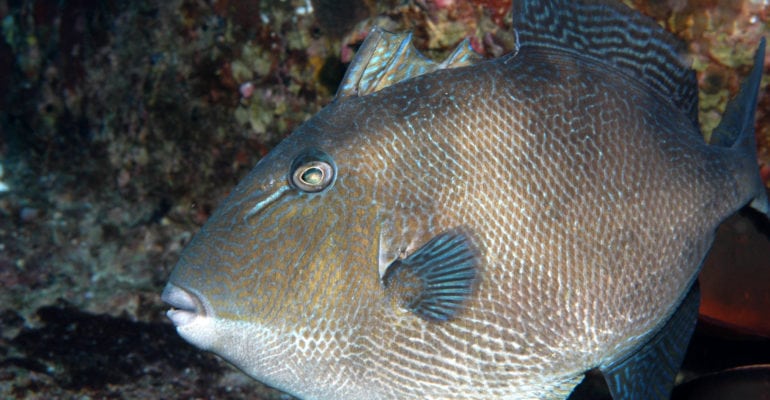The Gulf of Mexico Fishery Management Council (Council) met in Baton Rouge, Louisiana from January 30 – February 2, 2023. The Council heard a presentation on the Return ‘Em Right project and received and update from the Bureau of Ocean Energy Management on Wind Energy Development in the Gulf of Mexico. Mr. Dale Diaz stepped down from his role as the Council Chair and the Council elected Dr. Greg Stunz to serve as Chair and Dr. Tom Frazer as Vice Chair. The following is a summary of the Council’s actions:
Gray Triggerfish
The Council took final action on a framework action to modify the gray triggerfish commercial trip limit. The Council chose to increase the trip limit to 25 fish. The gray triggerfish annual catch limit was increased in 2021 and the commercial sector did not harvest its annual catch target in 2022 under the 16-fish trip limit. Increasing the trip limit should provide commercial fishermen the opportunity to land the commercial annual catch target, reduce discards, and help achieve optimum yield. The framework action will be transmitted to the Secretary of Commerce for approval and implementation as soon as practicable.
For-Hire Trip Declaration Requirements
The Council took final action on an abbreviated framework action to modify for-hire trip declaration requirements. Vessels with federal charter vessel/headboat permits for Reef Fish and/or Coastal Migratory Pelagics are currently required to submit a trip declaration (hail-out) anytime the vessel moves on the water. The Council considered feedback from stakeholders and chose to require federally permitted vessels to only submit trip declarations for trips that will be engaging in any type of fishing or chartered activity. The framework action will be transmitted to the Secretary of Commerce for approval and implementation as soon as practicable.
Florida Keys National Marine Sanctuary Proposed Rule
The Council heard recommendations from its Coral, Reef Fish, Spiny Lobster, Shrimp, and Coastal Migratory Pelagic Advisory Panels on the Florida Keys National Marine Sanctuary Proposed Rule. The Proposed Rule aims to expand the boundary of the sanctuary, update sanctuary-wide regulations, update the individual marine zones and their associated regulations, and revise the sanctuary’s terms of designation. The Council incorporated recommendations from its Advisory Panels into a comment letter that will be submitted to the Sanctuary as it develops the proposed rule.
Gray Snapper
The Council was presented with results of the most recent gray snapper stock assessment (SEDAR 75 2022), which showed that gray snapper is not overfished or experiencing overfishing. The Council’s Scientific and Statistical Committee provided updated recommendations to the gray snapper overfishing limit and acceptable biological catch. The Council decided to initiate work on a document that will increase the gray snapper catch limits and convert them to the updated recreational landings using the Marine Recreational Information Program’s Fishing Effort Survey (MRIP-FES) data units.
Red Grouper
The Council was presented with the results of a red grouper interim analysis, which is used to track trends in abundance based on the NMFS bottom longline survey. The interim analysis is performed to provide an update on stock health between stock assessments, and when warranted, used to modify catch advice. The red grouper interim analysis was reviewed by the Council’s Scientific and Statistical Committee (SSC). The SSC noted that the index of abundance is relatively unchanged in the last 10 years, and biomass levels remain low. As a result, the SSC did not recommend any changes to the catch limits. A full stock assessment for red grouper is set to begin in 2024.
Commercial Individual Fishing Quota Program
The Council heard a final report on its Individual Fishing Quota (IFQ) Program Focus Group which was tasked with reviewing the current IFQ programs’ goals and objectives, and recommending the replacement or retention of those goals and objectives. The focus group worked to define the changes needed to improve the Red Snapper and Grouper-Tilefish IFQ programs to address minimizing discards, fairness and equity, and new entrant issues. The Council also heard a presentation on Adaptive Catch Shares which cyclically reallocates shares to active participants in the fishery, and received a presentation from NOAA Fisheries outlining other potential changes to the program. The Council decided to conduct a review of the IFQ program goals and objectives and initiate an amendment to address program changes by the June 2023 Council meeting.
Gag Grouper
The Council continued work on Reef Fish Amendment 56, which considers revising catch limits, sector allocation, rebuilding timeline, and the recreational fishing season for gag. The most recent stock assessment (SEDAR 72 2022) determined that gag is overfished and undergoing overfishing. Additionally, the assessment identified that the proportion of males in the population is less than 2%, which negatively affects the stock’s ability to reproduce. The Council is obligated to end overfishing and develop a rebuilding plan by 2024 for gag, which will dramatically reduce catch limits during the beginning of the rebuilding period. During this meeting, the Council edited the alternatives in the document by removing consideration of a 19-year rebuilding timeline and removing consideration of a recreational fishing season with an opening date of November 1. The Council plans to host a series of public hearings along the west coast of Florida in Destin, Cedar Key, Tampa, and Naples, and virtually before taking final action on this document during the Council’s June 2023 meeting.
In recognition that further management modifications may be necessary to constrain gag harvest to newly anticipated catch limits, the Council initiated work on a document that will consider lowering the recreational bag limit and establishing a recreational vessel limit for gag and black grouper; and, adding additional spatial areas to protect spawning gag.
Greater Amberjack
During this meeting, the Council began work on a Framework Action that considers modifying the recreational closed season and the commercial trip limit. These changes are being considered to ensure that harvest is constrained to newly recommended catch limits set to allow the greater amberjack stock to rebuild. The Council added a new alternative that would create a 7-fish commercial trip limit and decided not to consider modifying management measures for the entire jacks complex, which includes lesser amberjack, banded rudderfish, and almaco jack.
Red Snapper Data Calibration Ratios
Private recreational red snapper seasons are monitored using MRIP in concert with landings data collected from Gulf state data collection programs. The state-specific annual catch limits were set using calibration ratios developed by the Gulf States and NOAA’s Office of Science and Technology and approved by the Council in 2020. Those calibration ratios convert state survey data to MRIP’s Coastal Household Telephone Survey data units (the predecessor to MRIP-FES). Using the recommendations from its SSC, the Council decided to begin work on a framework action to update the recreational red snapper data calibration ratios for Florida, Alabama, and Mississippi. The Council plans to begin work on this document at a future meeting.
Electronic Logbook Commercial Reporting
The Council continued to work on a joint amendment with the South Atlantic Fishery Management Council that considers requiring federal commercial reef fish and coastal migratory pelagic permit holders to submit logbooks electronically, rather than mailing paper logbooks. The Council heard support for the transition to electronic reporting from its Reef Fish and Coastal Migratory Pelagic Advisory Panels and will hear from its Data Collection Advisory Panel during its April 2023 meeting. The Council plans to conduct a mail-out to permit holders followed by virtual public hearings before taking final action during the June 2023 Council meeting.
Advisory Panel Appointments
Advisory Panels are re-appointed every three years. This year, the Red Drum and Coastal Migratory Pelagic Advisory Panels are up for re-appointment. Since the Red Drum Advisory Panel has not convened since it was repopulated three years ago, the Council decided that it was unnecessary to update its membership at this time. The Council does plan to move forward with re-populating its Coastal Migratory Pelagic Advisory Panel. This process will be initiated in the coming weeks and notifications on process will be shared across Council communications platforms.
Recreational Fisheries Management
The Council initiated work on a recreational fisheries management initiative for reef fish. The initiative aims to evaluate the efficacy of current recreational reef fish management and develop management approaches and guidance to prevent overfishing, address discards, account for uncertainty in data, and provide innovative new management approaches to regulating federally managed recreational fisheries.





